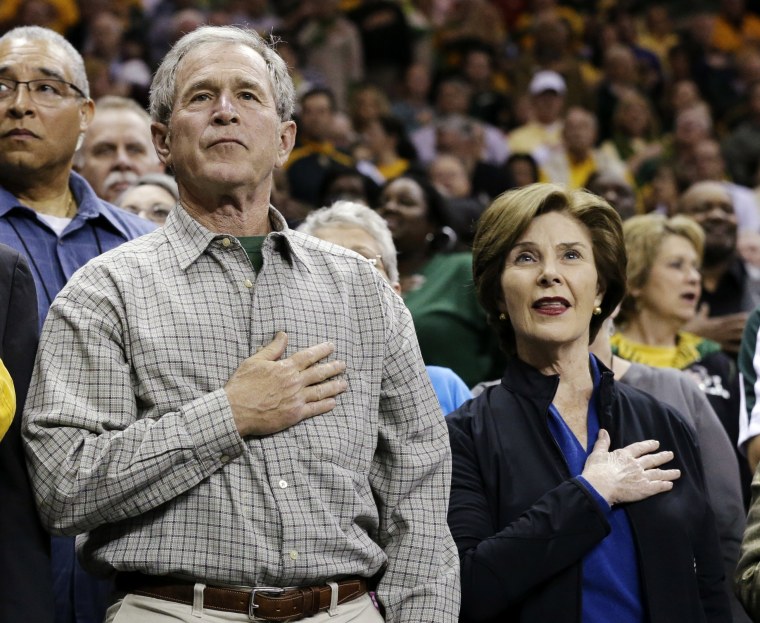New polls show that George W. Bush is not as unpopular now as when he left office. That bodes well for a public examination of his legacy but it’s difficult to look back on his presidency as something other than a preventable catastrophe. Thursday’s opening of the his Presidential Library and Museum in Dallas offers an opportunity to review his time in office, and while Bush professes a blithe unconcern with how history will judge him, a defensiveness about his presidency pervades a central feature of his new museum.
"There's no need to defend myself,” Bush said recently. “I did what I did and ultimately history will judge.”
That could stand as a slogan for the museum, says Brenden Miniter, senior editorial director of the George W. Bush Institute.
“The guiding principle in putting this museum together was just put the facts out there, pretty boldly, pretty directly, and let them speak for themselves and let visitors come to their own conclusions on the events that shaped the years that President Bush was in the White House,” said Miniter.
The worldview that the Bush presidency was passively shaped by events comes across in the museum like a petulant whine: You think you can do better?
The crown jewel in the interactive experience is "Decision Points Theater" where visitors can revisit "the decisions that I had to make and the recommendations I received," said Bush. At the “Defending Freedom Table,” you can view briefings from Bush aides and decide whether to invade Iraq or leave Saddam Hussein in power. That is a far cry from the question the former president posed after 9/11 when he said an invasion was the only way to keep the most dangerous weapons from getting into the hands of the worst people. Visions of biological weapons, yellow cake uranium, aluminum tubes and mushroom clouds ruined our sleep. To its credit, the exhibit has the decency to admit that no one ever found a single weapon of mass destruction.
At another table, you can decide whether to deploy federal troops to New Orleans after Hurricane Katrina or rely on local forces. At yet another, you can: Bail out Wall Street, or decide that the banks aren’t, in fact, too big to fail. Funding levee repairs or regulating derivatives are not offered as choices.
In its attempt to recast history by reframing the questions, this exhibit unconsciously replicates the remove with which Bush viewed his role.
“You get the information that the president had at the time, and then the press gets to come and ask, ‘What are you going to do?’ And you have this feeling of having to make a decision very quickly,” former first lady Laura Bush said about Decision Points Theater, as if the press was the pressure point instead of the issue itself. “Then you can vote and say what you would’ve done. And then George comes on the screen and says why he did what he did,” she said.
A presidential library is not a place for rigorous self-criticism, which makes it appropriate for Bush, a man who never wasted a day in contemplation of the road not taken.
“Much of my presidency was defined by things that you didn’t necessarily want to have happen,” said Bush recently.
You can’t prevent the mistakes of the past at a museum. You can’t stop Kennedy from going to Dallas at the JFK presidential library. You can’t pull out of Vietnam at the LBJ library. And you can’t stop Bill Clinton from deregulating Wall Street at his library.
Bush couldn’t have stopped a hurricane, but perhaps some of the 1,800 who died in the storm and aftermath may have been spared.
And if 9/11 was inevitable, his war of choice in Iraq, which cost the lives of 4,486 U.S. troops, was not. No matter what decision you make at his shiny new library, we’re all stuck with his legacy.
